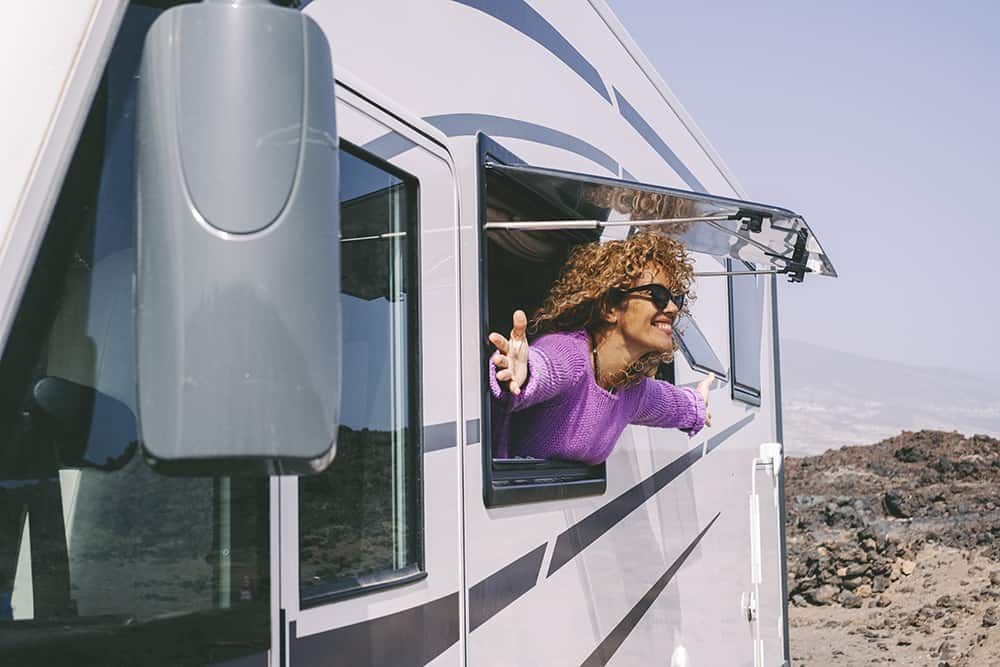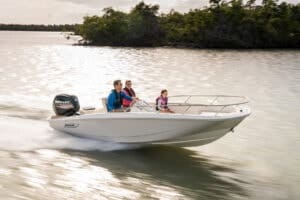Financing an RV doesn’t have to be a stressful process. You just need to know what you’re getting yourself into so you can be prepared. Some steps include determining your budget, researching financing options, comparing interest rates and loan terms, checking your credit score, applying for financing, and finalizing the loan. It’s important to determine a comfortable budget and explore different lenders to find the best financing options. A good credit score can also help secure better financing terms. Once approved, reviewing and signing the loan agreement is necessary before making your RV purchase. With the steps outlined here, financing an RV can be a manageable (and fun!) process, allowing you to enjoy your investment without undue financial burden.
So, the allure of traveling across the country in a comfortable and luxurious motorhome has you hooked? You may be retiring and ready to hit the road and check out all of the U.S.’ national parks, or you may have a summer vacation where you want to load up the kids and show them the Rocky Mountains, The Grand Canyon, and Lake Tahoe. Maybe you just want to check out more of your home state without having to deal with the hassle of booking flights and hotels. Wherever you want to go and whoever you want to go with, a recreational vehicle can get you there.
You just need to choose the RV that best fits your lifestyle. Do you want a drivable RV with plenty of space, separate bedrooms, and luxury features? Or are you more into a camper van or a pop up RV that you can tow behind your pickup truck?
Whatever RV you choose, whether it be new or used, spacious or small, Trident Funding can help you with RV financing. Our loan experts will get you the best RV loan rates whether you want to finance a camper or a house on wheels.
Financing an RV: What You Need to Know
Let’s get into the nitty gritty of RV loans and how to get into your RV and on the road as soon as possible.
The Steps to Financing an RV are:
1. Get Pre Approved
Some people will tell you to shop around for RVs and find one you like and then get pre-approved, but that is counterintuitive. You want to know how much you can afford so you’re not looking at RVs that are way out of your price range. Apply for an RV loan with Trident Funding and you will typically get an approval within 24 to 48 hours.
During the approval process, you should start to gather all of your necessary financial documents including your pay stubs, bank statements, and tax returns. Also have a copy of your identification and social security number handy. Lenders will also run your credit at this time to see what your credit score is and how much you’re pre-approved for. They will also let you know how much downpayment is required to qualify for the loan.
Once you know your pre-approval amount, you can start the fun process of RV shopping. Check out RVs online and in person and see which features you like and which layouts work the best for your needs.
2. Use an RV Loan Calculator
Now that you’re pre-approved for an RV loan, check out an RV loan calculator. Input the potential loan amount, the amount of your down payment, the sales tax percentage in your state, and the potential interest rate. Your lender will be able to give you an idea of what your interest rate will be and then once you have a loan commitment, the RV loan rate will be locked in and won’t change even if market rates go up.
The loan calculator will tell you what your approximate monthly payment will be. You can play around with the numbers to get a payment you feel comfortable with. This may be when you decide on a higher down payment or a lower loan amount.
3. Know Your Interest Rate
Now you know your approximate monthly RV loan payment, you want to get a more accurate representation of what your interest rate will be. You can use a free online tool to check current RV rates. This tool is provided by Trident Funding and is updated daily so rates are current and aren’t gimmick rates to just get you to click on their site.
You can choose from a credit score range, loan amount, loan type, and the year of the RV. This information will then give you your approximate interest rate. For example, let’s say you found an amazing, fully customized $500,000 RV that is really going to be a fabulous home on wheels. Your credit score is 770 and you want a long loan term of 20 years. In this scenario, your APR will be around 7.74%. If you raise your credit score to 800 or above, the rate will dip to around 7.49%.
4. Go Through The Underwriting Process
The underwriting process is when the lender reviews all of your documents and assesses the risk of the loan and you as the borrower and makes a determination if the loan is going to be funded or not. During this process, your credit score may be run again and you may be asked to provide further documentation. Keep in mind that a recreational vehicle is considered a luxury purchase, so lenders look for borrowers who have strong credit histories and are unlikely to default on the loan.
RV loans typically move along quite quickly and you may be able to drive away in your RV as quickly as a week after you applied for the loan.
5. Purchase Your Recreational Vehicle
Once your loan is approved, the dealer or whoever you purchase the loan from may need to get the RV ready for you. It may need to be cleaned, or any accessories that you chose may be added at this time. When it’s ready to go, Trident Funding will handle the remainder of the transaction for you including coordinating the closing, state registration, and title. Then all you need to do is get ready to drive your new RV away into the sunset. Road trips here you come!
Additional Financing Options for a Recreational Vehicle
In addition to financing an RV with Trident Funding, there are a few other ways to pay for your recreational vehicle.
Other financing options for RVs include:
- Direct dealership loans: If you purchase an RV directly from the dealership, they may finance it themselves, which is often referred to in-house financing. They may also refer you to their network of lenders.
- Online loans: Many online lenders offer RV loans, but look out for hidden fees, and high interest rates. Always research the lender and check out their reviews before filling out a loan application.
- Cash: If you opt not to finance an RV, you can pay cash. You will save on lender fees and interest, but you will have a large amount of money tied up in the vehicle that could’ve been used for other purposes like investments.
- Seller financing: If you’re buying an RV from a private party, they may offer seller financing. This means that the seller is ‘acting’ like the bank. Typically, you give them a downpayment and then make monthly payments until the loan is paid off. It’s a good idea to consult with an attorney so they can review the contract before you sign it. You also want to see the RV in person, if at all possible, before you make a deposit.
Recreational Vehicle Expenses
In addition to the down payment, lender fees, and interest costs, there are other expenses associated with owning an RV.
Remember to include the following RV expenses in your budget:
- Gas: RVs cost more to fill up than regular cars and you definitely don’t want to run out of gas on the side of the road with a camper full of people. Keep an eye on your fuel gauge and never let it go below the quarter mark. Check your owner’s manual to see which type of fuel is recommended for your RV. Tank size, fuel costs, and miles per gallon will all affect how much you spend on fuel. Some smaller RVs may only need $100 to fill up a tank where large RVs may require closer to $1,000.
- RV insurance: You will need a specialty type of insurance to cover your RV. It is similar to an auto policy and your current insurance company may offer it. It will offer coverage for liability, uninsured drivers, and property damage. RV insurance premiums vary widely bit expect to spend at least a couple thousand dollars per year.
- Accessories: You may need towing accessories including a hitch, furnishings, decor items, bedding, food, and drinks, and toiletries.
- Storage: Many people forget about storage costs, but where are you going to house your RV? If you live in a community that lets you park it in the driveway or the street then storage is free. Additional, small RVs may fit in your garage. However, you may need to pay storage costs if you have a large RV and can’t keep it at home. UHaul facilities often offer RV storage, as do some RV parks. It’s usually cheaper to store them outdoors.
- Maintenance and repairs: Just like with cars and boats, RVs need regular maintenance, should be serviced as recommended by the manufacturer, and may need to be repaired when something breaks.
- Warranty: A warranty may be included in the price of the RV if it’s new or you may want to purchase a separate RV warranty if it’s offered. Read what the warranty covers before you purchase it, so there’s no confusion about potential out of pocket expenses.
Financing an RV: A Few Tips to Remember
Here are some important tips to remember when financing an RV:
- Don’t make any major purchases until your RV purchase is complete. This means don’t buy furniture on your credit card or finance a new car etc. This will change your debt-to-income ratio and may end in a loan denial
- You know your finances better than anyone else. Just because you’re approved for a $400,000 RV doesn’t mean you need to spend that much. It’s always better to air on the conservative side and remember to factor in all of the additional expenses that come along with owning an RV.
- Keep your employment status the same until the loan goes through and the RV is yours. Don’t retire, switch careers, or decide to start a new business during the loan underwriting process. You were approved for the RV loan with the information you submitted, so it’s important to keep everything the same.
The Wrap Up: RV Financing
Now you know more about financing an RV and what to look for when choosing a lender. Remember to compare interest rates, terms, fees, and make sure that you can easily reach their customer service department in case questions arise.
The higher your credit score, the more loan products will be available to you, and the best RV loan rates and terms will be offered.
Before purchasing an RV, make sure it fits in your budget and remember to check out the free online RV loan calculator to get an idea of how much your monthly payments will be.




